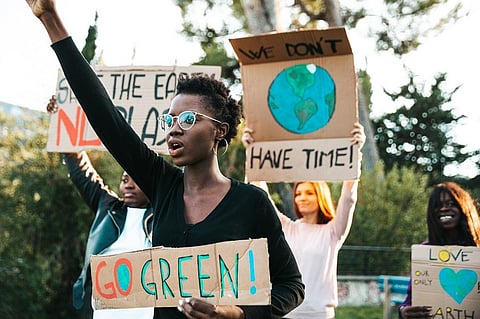

Young Europeans and Africans consider climate change as the biggest threat to the world, according to a new survey. But there are key differences in the degree to which they perceived the threat.
Every single European surveyed, cited climate change as a major concern. Most African participants did so. But some who did not, were concerned with fallouts of climate change like food insecurity, severe weather events and adverse economic conditions.
The survey report was released November 16, 2022, at the 27th Conference of Parties (COP27) to the United Nations Framework Convention on Climate Change. It was released by the European Investment Bank and two citizen-engagement platforms — Debating Africa and Debating Europe.
The Securing our Future report finalised its conclusions based on a survey conducted among 100 young people (18-35 years) from Africa and Europe. The report also enlisted potential solutions identified by the respondents.
The youth from agriculture-dependent countries — Ghana, Chad and Mauritania — identified a close link between agricultural production and climate change.
In Europe, climate change was ignored when the impact was felt elsewhere. The region started to act upon it only when Europeans felt the consequences.
The participants were aware of the links between climate change and other threats, such as migration, resource scarcity and conflicts.
Africa remains the most vulnerable continent despite its low contribution to greenhouse gas emissions, noted the participants from both continents.
“People in Africa are much more affected by climate change, than we are,” said Alvaro, a participant from Europe.
So, climate change interventions must be focused more towards Africa to reduce its impact on the region, said the participants from Africa.
Governments and institutions should work together on mitigation and adaptation. International institutions have an important role in responding to climate emergencies.
The respondents considered funding and measures to fight climate change as crucial. They felt that there should be more investment in renewable energy sources. Interventions in renewable energy can prevent future warming and counter energy insecurity.
The findings of the survey resonated with the global risks report, 2022. The report called for decisive actions to address the climate crisis.
Europe is desperately looking for alternatives to Russian gas amid the energy crisis driven by the war in Ukraine. Europe has been eager to invest in gas projects across Africa, given these circumstances.
But, the developed countries, particularly from the European Union, should halt financial support given for natural gas production and infrastructure projects, said the Climate Action Tracker (CAT) in a report released recently at the COP27.
The CAT report urged wealthy countries to support de-risking large-scale investment into clean energy technologies to accelerate just transition in Africa. The participants from Europe wanted to see countries end the use of gas, oil and coal and any subsidies these energy sources received.